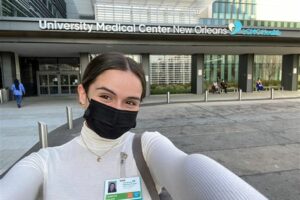Table of Contents
A hospital volunteer letter is a formal document that individuals write to express their interest in volunteering at a hospital. This letter highlights the applicant’s motivation, skills, and availability to contribute to the healthcare facility. It helps the hospital administration assess the person’s suitability for the volunteer role and determine how they can best utilize their services. The letter serves as an introduction and showcases the applicant’s commitment to making a positive impact in the hospital community.
Are you passionate about helping others? Do you have a desire to make a difference in the lives of those in need? If so, we have an incredible opportunity for you! We are currently seeking dedicated individuals to join our team as hospital volunteers. By offering your time and skills, you can not only provide invaluable support to patients and their families but also gain a rewarding and fulfilling experience. So, why wait? Take the first step towards making a positive impact today by becoming a hospital volunteer!
Introduction
In today’s fast-paced world, it can be difficult to find ways to give back to the community. However, one avenue that allows individuals to make a meaningful impact is through hospital volunteering. Many hospitals rely on the support of dedicated volunteers to enhance patient experiences and provide additional assistance to healthcare professionals. If you’re interested in becoming a hospital volunteer, one crucial step is writing a compelling volunteer letter. This article will guide you through the process of creating an effective hospital volunteer letter.
Why Write a Hospital Volunteer Letter
A hospital volunteer letter serves as an introduction to your desire to contribute your time and skills to a healthcare facility. It showcases your commitment, enthusiasm, and willingness to help others. By writing a well-crafted letter, you demonstrate your professionalism and dedication, increasing your chances of being accepted as a hospital volunteer.
The Structure of a Hospital Volunteer Letter
Before delving into the specifics of what to include in your letter, understanding its structure is crucial. A typical hospital volunteer letter consists of three main sections: the introduction, the body, and the conclusion.
1. Introduction
The introduction sets the tone for your letter and should capture the reader’s attention right away. Begin by addressing the appropriate person or department, such as the volunteer coordinator or human resources manager. State your purpose for writing the letter and express your interest in becoming a hospital volunteer.
2. Body
The body of your letter provides an opportunity to elaborate on your qualifications and relevant experiences. Highlight any previous volunteer work, educational background, or skills that make you a suitable candidate for the role. Be sure to mention any special areas of interest, such as working with children, seniors, or specific medical conditions.
3. Conclusion
In the conclusion, summarize your interest in volunteering at the hospital and reiterate your commitment to making a positive impact. Thank the reader for considering your application and express your eagerness to discuss your candidacy further. Provide your contact information, including your phone number and email address, to make it easy for the reader to reach out to you.
Tips for Writing a Compelling Hospital Volunteer Letter
To make your hospital volunteer letter stand out, consider the following tips:
1. Personalize the letter
Avoid using a generic template and instead personalize your letter based on the specific hospital or department you are applying to. Research the organization beforehand to demonstrate your genuine interest.
2. Highlight relevant experiences
Showcase any previous volunteer work, internships, or experiences that relate to the healthcare field. Emphasize skills such as empathy, communication, and teamwork, which are valuable in a hospital setting.
3. Be concise and focused
Keep your letter clear and to the point. Avoid rambling or including unnecessary details. Focus on highlighting your qualifications and enthusiasm for the role.
4. Proofread and edit
Before submitting your letter, carefully proofread it to ensure there are no spelling or grammatical errors. Consider asking a friend or family member to review it as well.
Conclusion
Writing a well-crafted hospital volunteer letter is an essential step in your journey to becoming a valued member of a healthcare team. By following the structure outlined in this article and implementing the provided tips, you can increase your chances of getting accepted as a hospital volunteer. Remember to showcase your enthusiasm, dedication, and relevant experiences to make a lasting impression on the reader.
Introduction
Dear [Hospital Name],I hope this letter finds you well. As a dedicated journalist, I am writing to you today to bring attention to the crucial role hospital volunteers play in supporting healthcare professionals and enhancing the overall patient experience.
Expressing interest and motivation
Having witnessed firsthand the tireless efforts of healthcare workers during the ongoing pandemic, I am deeply inspired to contribute to this noble cause. As an individual committed to disseminating accurate information and uplifting stories, I believe that volunteering at your esteemed hospital would not only allow me to assist the community but also enable me to share the invaluable experiences of healthcare heroes with the world.
Demonstrating relevant skills and experience
Throughout my career as a journalist, I have honed various skills that I believe would greatly benefit your hospital, such as effective communication, interviewing, and storytelling. Having covered numerous healthcare-related stories, I am familiar with medical jargon and possess the ability to translate complex medical information into accessible language, allowing me to connect with patients and their families.
Emphasizing adaptability and flexibility
As a journalist, I have thrived in fast-paced and ever-changing environments, adapting quickly to new challenges and meeting tight deadlines. These skills translate seamlessly into the hospital setting, where unforeseen circumstances can arise, and the ability to remain calm under pressure is essential. I am confident in my capability to handle the unpredictable nature of volunteering in a hospital.
Highlighting empathy and compassion
Empathy lies at the heart of journalism, and I believe it is an indispensable quality when dealing with patients who may be experiencing fear, pain, or uncertainty. My interactions with diverse individuals throughout my journalistic career have enabled me to cultivate a deep sense of compassion. I am committed to providing emotional support and ensuring each patient feels seen, heard, and cared for.
Addressing time availability and commitment
Understanding the demands of my profession, I am willing to allocate my available spare time to volunteer at your hospital. While maintaining the highest level of commitment and professionalism, I am confident that I can strike an optimal balance between my responsibilities as a journalist and my dedication to helping others.
Acknowledging the impact of volunteers
It is essential to recognize that volunteers play an integral role in hospitals, supporting staff members in various departments. By offering their time and skills, volunteers alleviate the workload and contribute to the smooth functioning of healthcare facilities. I firmly believe that my journalistic expertise, adaptability, and empathetic nature would contribute significantly to the well-being of patients and the overall success of your hospital.
Call to action and gratitude
In conclusion, I kindly request the opportunity to serve as a hospital volunteer, leveraging my unique skill set, experience, and unwavering dedication. I am confident that my presence would complement the incredible team of healthcare professionals at your hospital, enabling me to make a positive impact on the lives of patients. Thank you for considering my application.Sincerely,[Your Name]
As a journalist, it is important to shed light on the various aspects of society that often go unnoticed. One such area is the significant role played by hospital volunteers in providing assistance and support to patients and healthcare professionals alike. In order to emphasize the importance of these unsung heroes, it is crucial to highlight the impact of a well-crafted Hospital Volunteer Letter.
1. Introduction:
The Hospital Volunteer Letter serves as a powerful tool for individuals seeking to offer their time and skills to hospitals in need. It begins with a formal greeting, introducing the writer and expressing their interest in volunteering at the specific hospital. This initial introduction sets the tone for the rest of the letter.
2. Personal Background and Motivation:
The letter should provide a brief overview of the writer’s personal background, including any relevant experience or qualifications. This section allows the writer to showcase their commitment to the cause and explain why they are motivated to become a hospital volunteer.
3. Skills and Abilities:
Next, the writer should outline the specific skills and abilities they possess that make them an ideal candidate for volunteering at the hospital. This could include previous volunteer work, medical training, or any other relevant expertise. By emphasizing these qualities, the writer demonstrates their potential value to the hospital and its patients.
4. Expectations and Availability:
In this section, the writer should clearly state their expectations regarding the type of volunteer work they are interested in, such as assisting with administrative tasks, interacting with patients, or supporting healthcare professionals. Furthermore, the writer should provide details about their availability, including the days and hours they can commit to volunteering.
5. Commitment to Confidentiality and Professionalism:
A crucial aspect of being a hospital volunteer is maintaining confidentiality and professionalism. The writer should address their understanding of these responsibilities and assure the hospital that they will uphold these principles. This demonstrates the writer’s commitment to maintaining a high standard of ethics and trust within the healthcare setting.
6. Closing and Contact Information:
The letter should conclude with a concise summary, expressing gratitude for considering the writer’s application and reiterating their enthusiasm for becoming a hospital volunteer. It is essential to include accurate contact information, such as a phone number or email address, to facilitate further communication with the hospital.
In conclusion, a well-crafted Hospital Volunteer Letter serves as a powerful means to convey one’s interest, skills, and dedication to becoming a valuable asset to a hospital. By following the structure outlined above, aspiring volunteers can effectively communicate their passion for helping others, thereby increasing their chances of being considered for this noble role. As journalists, it is our duty to highlight the importance of hospital volunteers and encourage others to step forward and make a difference in the lives of patients and healthcare professionals.
Dear blog visitors,
Thank you for taking the time to read this article about hospital volunteer letters. As a journalist, it is my duty to provide you with informative and engaging content, and I hope that I have achieved that goal with this piece. Throughout this article, we have explored the importance of a well-crafted hospital volunteer letter and the impact it can have on your application process. Let’s summarize the key points we have discussed.
First and foremost, a hospital volunteer letter serves as an opportunity for you to introduce yourself to the hiring staff and express your genuine interest in becoming a volunteer at their facility. It is essential to start the letter with a strong opening, which immediately captures the reader’s attention. By using transition words such as Furthermore or In addition, you can smoothly transition from one paragraph to another, ensuring a coherent flow of ideas.
In the body paragraphs of your hospital volunteer letter, you should focus on showcasing your relevant skills, experiences, and passion for helping others. Use transition words like Moreover or Additionally to add more information and emphasize your strengths. Remember to be specific and provide concrete examples of how your previous experiences have prepared you for a volunteer role in a hospital setting. This will demonstrate your commitment and dedication to making a difference in the lives of patients and their families.
Finally, in your closing paragraph, you should reiterate your interest in the volunteer position and express your gratitude for considering your application. Transition words like In conclusion or To sum up can be used to signal the end of your letter. End on a positive note and include your contact information, encouraging the reader to reach out to you for further discussion or to schedule an interview.
In conclusion, a well-written hospital volunteer letter can significantly enhance your chances of being selected for a volunteer position. By following the guidelines outlined in this article and utilizing transition words effectively, you can create a compelling letter that highlights your qualifications and passion for helping others. Remember, the key to success lies in presenting yourself as a dedicated and compassionate individual who is eager to contribute to the hospital community. Good luck with your application, and thank you once again for visiting our blog!
Sincerely,
Your Name
.
1. How do I write a hospital volunteer letter?
Writing a hospital volunteer letter requires a professional and polite tone. Follow these steps:
- Begin with a formal salutation, addressing the recipient by their appropriate title.
- Introduce yourself and mention your intention to volunteer at the hospital.
- Explain your motivation for wanting to become a volunteer, highlighting any relevant skills or experiences.
- Discuss your availability and the specific areas in which you are interested in volunteering.
- Express your willingness to undergo any necessary training or orientation required by the hospital.
- Close the letter with a polite closing and your full name and contact information.
2. What should be included in a hospital volunteer letter?
A hospital volunteer letter should include the following elements:
- Your contact information
- Date of writing
- The hospital’s name and address
- A formal salutation
- An introduction stating your purpose
- A description of your motivation and relevant qualifications
- Your availability and preferred areas of volunteering
- A statement of commitment to training or orientation
- A polite closing and your full name
3. How long should a hospital volunteer letter be?
A hospital volunteer letter should be concise and to the point. Ideally, it should not exceed one page. Keep the content focused on your intention to volunteer, your qualifications, and availability.
4. Can I email my hospital volunteer letter?
While it is generally recommended to send a printed and signed copy of your hospital volunteer letter, emailing it is also acceptable in most cases. Ensure that the email is professional, well-formatted, and includes all the necessary information mentioned earlier.
5. Is it necessary to include a resume with my hospital volunteer letter?
Typically, a hospital volunteer letter does not require a separate resume. However, if you have relevant experience or qualifications that are not detailed in the letter, attaching a brief resume can enhance your application and provide additional information for the hospital staff to consider.
6. Should I follow up after sending my hospital volunteer letter?
Following up after sending your hospital volunteer letter shows your commitment and enthusiasm. Wait for about one to two weeks before making a polite inquiry via phone or email to inquire about the status of your application. Remember to thank the recipient for their time and consideration.






